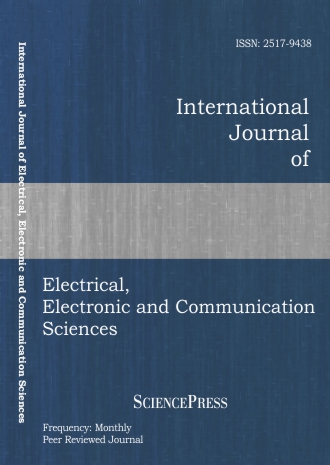
Scholarly
Volume:2, Issue: 5, 2008 Page No: 716 - 725
International Journal of Electrical, Electronic and Communication Sciences
ISSN: 2517-9438
Library Aware Power Conscious Realization of Complementary Boolean Functions
In this paper, we consider the problem of logic simplification for a special class of logic functions, namely complementary Boolean functions (CBF), targeting low power implementation using static CMOS logic style. The functions are uniquely characterized by the presence of terms, where for a canonical binary 2-tuple, D(mj) ∪ D(mk) = { } and therefore, we have | D(mj) ∪ D(mk) | = 0 [19]. Similarly, D(Mj) ∪ D(Mk) = { } and hence | D(Mj) ∪ D(Mk) | = 0. Here, 'mk' and 'Mk' represent a minterm and maxterm respectively. We compare the circuits minimized with our proposed method with those corresponding to factored Reed-Muller (f-RM) form, factored Pseudo Kronecker Reed-Muller (f-PKRM) form, and factored Generalized Reed-Muller (f-GRM) form. We have opted for algebraic factorization of the Reed-Muller (RM) form and its different variants, using the factorization rules of [1], as it is simple and requires much less CPU execution time compared to Boolean factorization operations. This technique has enabled us to greatly reduce the literal count as well as the gate count needed for such RM realizations, which are generally prone to consuming more cells and subsequently more power consumption. However, this leads to a drawback in terms of the design-for-test attribute associated with the various RM forms. Though we still preserve the definition of those forms viz. realizing such functionality with only select types of logic gates (AND gate and XOR gate), the structural integrity of the logic levels is not preserved. This would consequently alter the testability properties of such circuits i.e. it may increase/decrease/maintain the same number of test input vectors needed for their exhaustive testability, subsequently affecting their generalized test vector computation. We do not consider the issue of design-for-testability here, but, instead focus on the power consumption of the final logic implementation, after realization with a conventional CMOS process technology (0.35 micron TSMC process). The quality of the resulting circuits evaluated on the basis of an established cost metric viz., power consumption, demonstrate average savings by 26.79% for the samples considered in this work, besides reduction in number of gates and input literals by 39.66% and 12.98% respectively, in comparison with other factored RM forms.